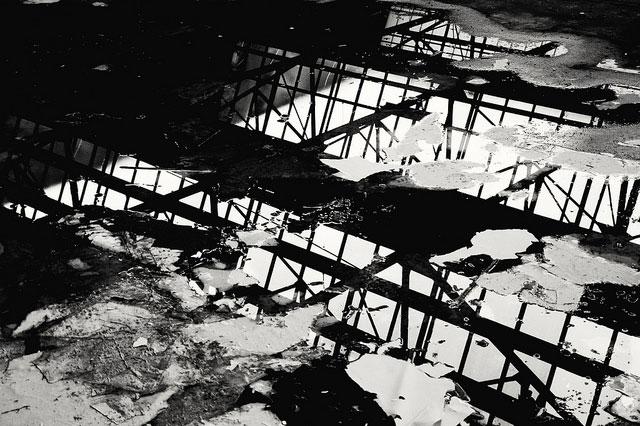
The following is the Truthout interview with John Feffer, author of Splinterlands.
Mark Karlin: Splinterlands is indisputably a dystopian novel. How do you define that genre?
John Feffer: Dystopias are about a world gone bad. They extrapolate from existing trends to the point of exaggeration in order to serve as a warning. Avoid complacency at all costs, the dystopian novelist is saying: bad things do not go away by themselves. Of course, I wrote my novel back in late 2015, and I didn’t expect either the UK to support Brexit or American voters to put Donald Trump in the White House. I expected a certain amount of complacency in both Europe and the United States after they’d dodged these two bullets.
In general, dystopian novels are telegrams delivered to the frog in the pot when it still thinks it’s sitting in a hot tub. Do something before it’s too late, the telegram says, or else you’re cooked.
How does the disintegration of your family in the book serve as a metaphor for the unraveling world of 2050?
The main character, Julian West, is estranged from his family. His wife left him back in the 2020s to join a commune. His three children have stopped communicating with him. The book begins with his decision to go on a double quest — to understand why the world fell apart and also why his family fell apart. To a certain extent he knows the answers to both these questions before he undertakes his journey, and the answers are the same. But he doesn’t truly understand this connection until his journey is complete.
 John Feffer. (Photo: Haymarket Books)Each member of his family represents a different facet of the problem of disintegration. His daughter works in what was once the European Union, and she confronts the terrors of nationalism every day in a Brussels that looks like Baghdad. His older son lives in what was once China and has profited off the “creative destruction” of the global economy. His younger son has taken a more militant path, putting his idealism into action. And West’s wife is trying to survive the effects of climate change in northern Vermont.
John Feffer. (Photo: Haymarket Books)Each member of his family represents a different facet of the problem of disintegration. His daughter works in what was once the European Union, and she confronts the terrors of nationalism every day in a Brussels that looks like Baghdad. His older son lives in what was once China and has profited off the “creative destruction” of the global economy. His younger son has taken a more militant path, putting his idealism into action. And West’s wife is trying to survive the effects of climate change in northern Vermont.
It’s often said that the shoemaker’s children go barefoot. Julian West may be quite astute about why empires and institutions fall apart. But those insights didn’t help him keep his family together.
How did you decide to write this as a “report” looking backward on how the global community fell apart?
I was influenced, of course, by the novel Looking Backward by Edward Bellamy. The product of a more optimistic age, Bellamy’s book charted one possible trajectory for the world heading out of the 19th century. My main character, named Julian West in homage to Bellamy’s book, is an academic, which allowed me to include material that is usually not included in a novel — about political, economic, social and environmental trends. West also maintains a certain scholarly distance from the material he is studying, which also helps explain the dynamic within his family.
I thought it would be interesting as well to play with the contrast between “report” language and “novel” language. The inclusion of footnotes in the text is one additional twist. They start out as the usual academic footnotes. Then they start to include bits and pieces of the plot until by the end, the subtext has practically taken over the text.
You have written online about the decline of the US into mediocrity, but mediocrity with a dominating military global presence. How did this affect your thinking when you wrote Splinterlands?
There has been a substantial literature on the decline of the US empire, with Paul Kennedy’s The Rise and Fall of Great Powers as perhaps the first major contribution to the genre. His book was published in 1987, the year after I graduated from college. So you might say that my entire professional life has been framed by this question of American decline, a decline that has been both masked and facilitated by our hypertrophied military. The long view that Kennedy takes is very similar to the long view of Julian West, who has created the discipline of geo-paleontology (the study of why large geopolitical entities go extinct).
What particularly interests me about this topic is how decline becomes normalized. It’s rare that a country goes from superpower to nonentity in one day. Empires, too, have their lengthy aging process. So, here in Washington, DC, for example, we have gradually gotten used to the utter breakdown of the subway system. This is the capital of the most powerful country in world history, or so we’ve been told, and yet it can’t manage to transport people to work on a reliable basis. The murder rate here is shocking, and so are the poverty and infant mortality rates. If the showcase city of the United States suffers from these problems, it becomes easier for the population as a whole to accept the widespread decline of the country’s infrastructure, the pitiful shape of many public schools, and even, as the latest reports suggest, the US inability to keep up with the rest of the industrialized world on such basic indicators as life expectancy. Of course, not everyone accepts this state of affairs, but it seems as though the majority of policymakers in DC have resigned themselves to the dismal status quo.
So, the trick of Splinterlands was to normalize the fragmentation of the world. It’s the opposite of the Brechtian effect of making the everyday seem strange. The task of the dystopian novelist is to make the very strange seem normal.
The world is atomized in 2050 in your novel. You write that there are “400-plus members” in the United Nations who are fractious and without any glue to hold them together to achieve a positive common purpose. Doesn’t this really represent the reality of an “Un”-United Nations?
The United Nations, even at its current level of membership, is hard-pressed to achieve much common purpose. From the beginning, the UN was divided by the Cold War, manipulated by the great powers, and riven by numerous regional, sectarian and ideological differences. In the post-Cold War era, we’ve seen a bit more consensus on such issues as climate change and human rights. But “United Nations” has always been something of a misnomer, reflecting aspirations rather than reality. The breakdown of multiethnic states — in the absence of strong regional blocs like the European Union — will only complicate the organization’s mission. After all, if California, Catalonia and Calabria give up on compromising with their own federal centers, why should they submit to the demands of more far-flung entities?
The UN is what remains of a progressive vision that would one day lead to a world government. That so many people consider “world government” a dystopian vision rather than a utopian one provides some insight into the state of progressive internationalism today, alas.
Can you speculate a bit on what you call the “financial meltdown of 2023” and its impact on accelerating a dystopian planet?
The last major financial crisis in 2008 was a dystopia for millions of people. They lost their houses, their savings, their pensions. It should have been a wake-up call for the United States to regulate Wall Street more effectively (among other things). It should have been an opportunity for the European Union to restructure the Eurozone. Brexit and the election of Donald Trump were the delayed consequence of these failures.
Truthout Progressive Pick

What will the year 2050 bring? John Feffer draws on years of geopolitical and globalization research to deliver a powerful dystopian novel.
Click here now to get the book!
The factors that contributed to the 2008 financial crisis have not gone away. Banks and other financial institutions are still developing ever more sophisticated instruments of “wealth creation” that further widen the gap between rich and poor. Worse, the Trump administration is committed to removing the few regulatory mechanisms put into place after the crisis.
Given that such crises are built into the very DNA of our current global economy, it doesn’t take a crystal ball to predict that the “next big one” will probably hit with even more force than the last. The greed and corruption unleashed by the Trump administration will probably pop the bubble of “irrational exuberance” just after the 2020 elections, though it could happen sooner if the Trump crowd fails at their efforts to keep the market artificially inflated.
In Splinterlands, I speculate that the 2023 crisis sounds the death knell for the European Union, for it can no longer accommodate economies performing at such different levels. It undermines the authority of the Communist government in China, since it can no longer promise continued economic expansion, which leads to the disintegration of the country. The United States, already hobbled by Hurricane Donald in 2022, continues its downward trajectory. The middle class has disappeared everywhere. The only entity that benefits from a financial crisis is the planet itself, for the drop in overall economic activity means fewer carbon emissions and pollution in general. But by 2023, if the international community doesn’t commit to more strenuous efforts to cut emissions, it will be too late to reverse the trend.
Of course, none of these futures is inevitable. We’re sitting in our hot tubs, receiving our telegrams. It’s not too late to act. It’s not too late to get out of hot water.
Speaking against the authoritarian crackdown
In the midst of a nationwide attack on civil liberties, Truthout urgently needs your help.
Journalism is a critical tool in the fight against Trump and his extremist agenda. The right wing knows this — that’s why they’ve taken over many legacy media publications.
But we won’t let truth be replaced by propaganda. As the Trump administration works to silence dissent, please support nonprofit independent journalism. Truthout is almost entirely funded by individual giving, so a one-time or monthly donation goes a long way. Click below to sustain our work.